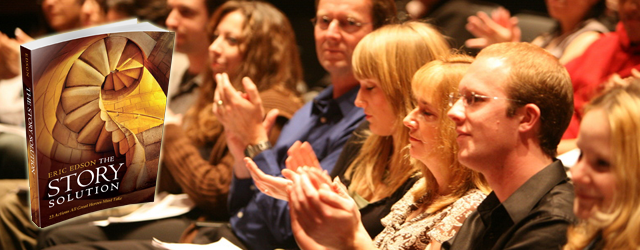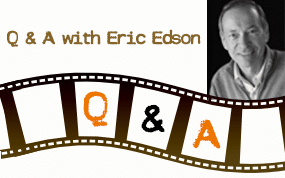Why It’s Great To Be A Storyteller by Eric Edson
Let’s just say it ain’t for the faint of heart.
Storytellers work exhausting days, ever searching for that gem of an idea or character or plot. Never settling for the almost-right word. Spitballing, outlining, writing, rewriting, rewriting…and then for the filmic storytellers among us, it’s on to shooting. Cutting. Shooting again. Novelists and screen storytellers alike are eternally either creating stories or thinking about creating stories.
And stuffing life in as fast as they can. It’s a two-fisted job.
All artists are driven from within, driven to learn. And each time we open a book on writing or walk in the door of a class on screenwriting or moviemaking eager to expand our storybuilding skills, it’s always because somewhere deep inside there’s another tale about to burst forth. A new saga demanding to be told.
What a splendid feeling, this passion for storytelling. More than a vocation. It’s truly a way of life.
But since all artists are condemned at birth to be honest with themselves, we fable-makers also know that the most important lessons about this passion will never be found in any book or class.
The most crucial truths about mythmaking for print or film can only be discovered on a personal journey to the center of the universe. On that lonely trip to the center of self. Because only there can we ask the really tough questions.
Who am I?
Why do I want to write novels or movies?
What is it exactly that I burn so deeply to share?
Am I willing to alter my daily life and that of my family in order to support the many challenging years required to pursue this dream?
Am I tough enough to stand naked before the world asking to be judged?
Writers and filmmakers swim in a sea of questions. Most can never be fully answered, of course, but asking them does keep us on our toes.
We watch. We observe. We notice details about people and about everyday life that many others miss. And we all shoot footage on the sly, with our eyes, then store it away in that best and most sacred vault, memory.
Often a bit guarded, many of us take comfort in solitude and tend toward quiet obsessions. But storytellers, like all artists, are also those souls most in touch with their own humanity.
We puzzle over the good and bad in our species – why we are here on Earth at all and, each in our own small way, what we might help humanity to become. Yarn-spinners of all types are sage explorers of complex inner worlds.
And we are time travelers, every one.
I always recommend to writers that they do some acting. Doesn’t matter if you’re good at it or not, although you’ll never know until you try. In a workshop or community playhouse go learn what it takes to deliver a line of dialogue believably, find out what it’s like to lift words from a page and make them come alive. Discover what it feels like to submerge yourself inside a character while an audience watches your every move. Novelists, too, should experience first hand this physical transmogrification into another human being. It’s a real jolt for the imagination.
Then as you work toward your next project, cherish the memory of Franz and Vincent.
Both labored long and hard, completely unrecognized throughout their lives. Both died broke and undiscovered. Yet Franz Kafka and Vincent Van Gogh were two of the greatest creative minds ever to walk this planet.
Did the lack of income from writing make Franz any less a writer? Vincent any less a painter?
Always remember that the art and craft of story creation isn’t just about making money. Selling a book or script is great, and an important goal. Selling brings its own kind of validation and allows you to continue your journey. But you earn the right to call yourself a writer – or director, or cinematographer, or producer or all of the above – the very first day that you set out to do the work.
I’ve never known a successful writer or filmmaker who did it just for the money. Oh, some in a cynical mood might say so, but keep after them and they’ll eventually confess it isn’t true. If it’s really only the money you find attractive there are other ways to make more bucks more quickly. Go get an M.B.A.
You still want to tell stories? Then write about what matters to you, what moves you, what gets your blood up. If you really care about what you’re saying with your work you can’t help but make other people care, too.
And here’s the kicker. Here’s the most important question any of us can ask.
When an epoch passes away, what is it that civilizations leave behind to reveal to future generations the truth of who they really were and what they learned in those few, fleeting seconds they lived on this galactic speck? What did the Greeks leave behind, or the Chinese warlord dynasties, or the Paleolithic cave peoples – that still today imparts to us, the living, the truth about their hearts and souls? About what they loved and hated, what it was that made them laugh and weep?
Not gold doubloons at the bottom of the sea. Not monuments to political egos, or economic theories, or rocks brought back from a few quick minutes shuffling around on the moon. No. Those departed cultures left behind – to be pondered forever – the wise and insightful work of their painters, sculptors, mythmakers and poets. Their artists.
Only through art does any civilization truly live forever.
Yes. It’s absolutely great to be a storyteller.
Write onward, all.
© Eric Edson 2011



